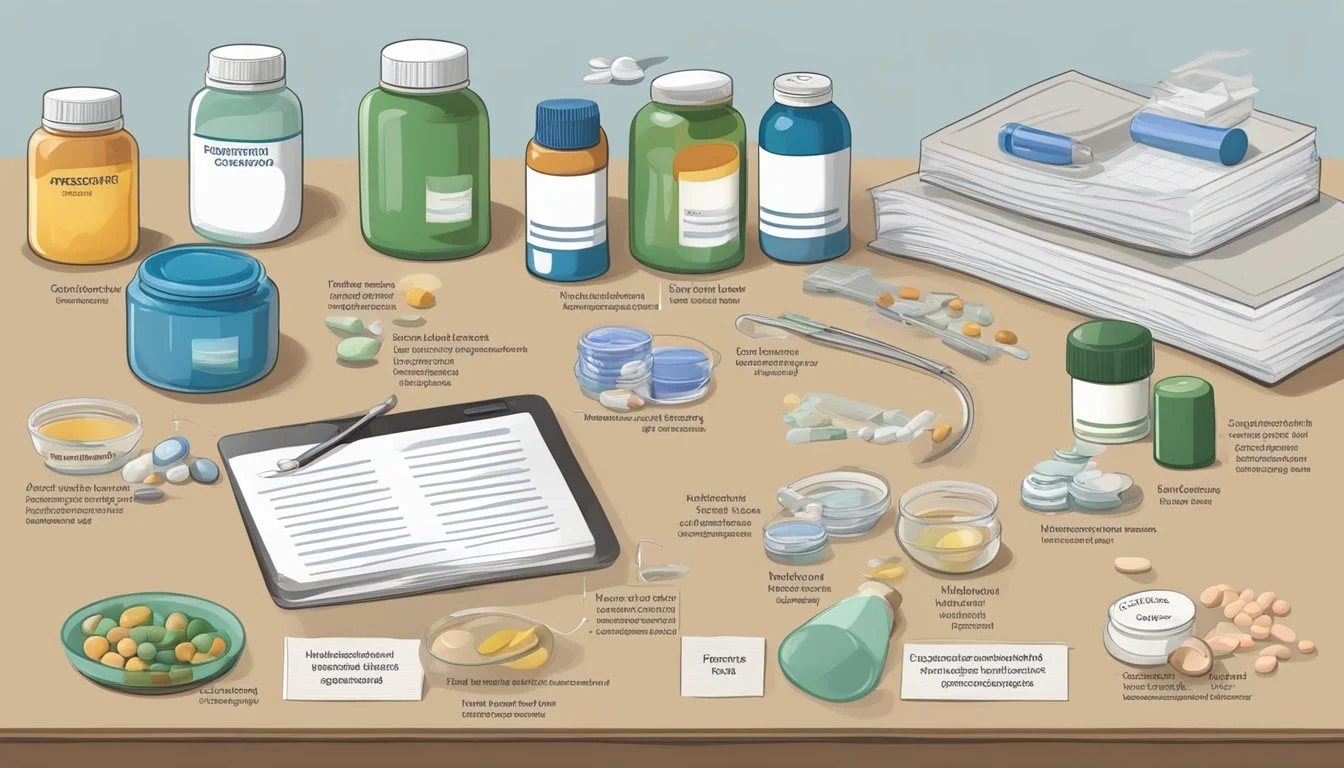6 Techniques for Managing PTSD-Related Gastrointestinal Issues
Effective Strategies for Relief
Post-traumatic stress disorder (PTSD) affects millions of people worldwide, often leading to various physical symptoms, including gastrointestinal issues. These digestive problems can severely impact daily life, making it crucial to find effective management techniques.
Understanding the connection between PTSD and gastrointestinal disorders is essential for devising proper coping strategies. By exploring techniques specifically designed to manage these symptoms, individuals can improve their quality of life and gain greater control over their health.
1) Dietary Changes
Making dietary changes can significantly impact the management of PTSD-related gastrointestinal issues. Incorporating high-fiber foods, such as fruits, vegetables, and whole grains, can improve gut health. A diet rich in fiber supports regular bowel movements and helps maintain a healthy gut microbiome.
Adopting a Mediterranean diet, known for its emphasis on fruits, vegetables, whole grains, and healthy fats, may alleviate PTSD symptoms. This diet can improve the gut microbiome and reduce inflammation. It can also promote better digestion and overall gut health.
Reducing the intake of processed foods, high in sugars and unhealthy fats, can also help. These foods can exacerbate gastrointestinal issues and negatively affect the gut microbiome. By avoiding them, one can potentially experience fewer digestive problems.
Staying hydrated is essential. Drinking enough water daily aids digestion and prevents constipation. Herbal teas like peppermint and ginger can also soothe the stomach and reduce symptoms.
Incorporating probiotics, whether through supplements or foods like yogurt and kefir, can be beneficial. Probiotics help maintain a balanced gut microbiome, which is crucial for digestive health. This balance may contribute to a reduction in PTSD-related gastrointestinal symptoms.
Implementing these dietary changes can be a practical step towards managing gastrointestinal issues associated with PTSD. For more specifics on dietary impacts, the Mediterranean diet has been highlighted in recent research.
2) Probiotic Supplements
Probiotic supplements can play a crucial role in managing gastrointestinal issues related to PTSD. These supplements contain beneficial bacteria that support gut health, which can be disrupted by stress and anxiety.
Different probiotics offer various strains of bacteria, each with unique benefits. For inflammation, Ritual Synbiotic+ at Amazon is highly recommended. Women may benefit from Garden of Life Dr. Formulated Probiotics For Women.
Selecting the right probiotic depends on individual needs. Culturelle Daily Probiotic is a reliable option available at drugstores. It supports daily gut health with a well-researched strain.
Individuals with PTSD should consult healthcare providers before starting any new supplement. Personalized medical advice can help select the best option for specific gastrointestinal concerns.
Probiotic supplements are generally safe, but they can interact with other medications or conditions. Proper guidance ensures effective and safe usage.
Overall, incorporating probiotics can support the balance of gut bacteria and potentially alleviate some gastrointestinal symptoms. This approach can be a valuable part of a comprehensive PTSD management plan.
3) Stress Management Techniques
Stress management is crucial for improving gastrointestinal disorders related to PTSD. Engaging in regular physical activity can help reduce stress levels. Activities like walking, jogging, and yoga promote relaxation and improve overall digestive health by increasing blood flow and reducing tension.
Mindfulness meditation is another effective technique. By focusing on the present moment, individuals can reduce anxiety and stress. This practice can calm the nervous system and potentially ease symptoms of gastrointestinal distress.
Deep breathing exercises can also be beneficial. Simple techniques such as diaphragmatic breathing help manage stress by activating the body's relaxation response. Practicing these exercises regularly can reduce stress-related gastrointestinal symptoms.
Therapies like cognitive-behavioral therapy (CBT) can be helpful in managing stress. CBT helps individuals identify and change negative thought patterns that contribute to stress. This, in turn, can reduce the impact of stress on the digestive system.
Journaling is another effective method. Writing about daily experiences and feelings can help individuals process stressful events. This practice can provide a sense of control and clarity, reducing the emotional burden that impacts the gastrointestinal tract.
Lastly, incorporating dietary changes can aid stress management. Foods rich in vitamins and minerals support the body's stress response. Avoiding caffeine and alcohol, which can exacerbate anxiety, may also help to alleviate stress-related gastrointestinal issues.
4) Medications for Symptom Control
Medications play a vital role in managing PTSD-related gastrointestinal issues. They can help reduce symptoms such as anxiety, depression, and sleep disturbances, which often exacerbate GI problems. Effective medication management can make it easier for individuals to participate in other treatments and maintain their daily routines.
Selective serotonin reuptake inhibitors (SSRIs), such as sertraline and paroxetine, are commonly prescribed to address anxiety and depressive symptoms in PTSD. These medications can indirectly improve gastrointestinal issues by alleviating stress-related flare-ups.
For more severe symptoms, benzodiazepines might be used, though they are generally prescribed with caution due to the potential for dependency. Medications like clonazepam and lorazepam can provide short-term relief from acute anxiety but are not typically recommended for long-term use.
Additionally, antipsychotic medications such as risperidone may be considered. These can help manage more severe PTSD symptoms, but their use is usually limited due to potential side effects.
It's also important to note that beta-blockers like propranolol can help reduce physical symptoms of anxiety, such as palpitations and sweating, which may indirectly benefit gastrointestinal functioning.
For comprehensive treatment options, referring to a clinician's guide on PTSD medications can provide an in-depth understanding of different choices and their appropriateness for individual cases. These approaches should be personalized, often in conjunction with therapy, for the best outcomes.
5) Mindfulness and Meditation
Mindfulness and meditation can play a significant role in managing PTSD-related gastrointestinal (GI) issues. These practices involve focusing on the present moment and regulating breathing, which can help reduce overall stress levels.
Studies show that mindfulness-based stress reduction (MBSR) programs are effective in alleviating various chronic conditions. They offer psychological and physiological benefits, potentially improving digestion and immune function while decreasing inflammation.
Incorporating mindfulness into daily routines can help individuals become more aware of their body's needs and reactions. This awareness can lead to better dietary choices and improved eating habits, which are crucial for managing GI symptoms.
Research on mindfulness-based interventions reveals a medium effect size on PTSD symptom reduction. Greater trait mindfulness is linked to decreased PTSD symptoms, highlighting the importance of integrating these practices for those with PTSD-related GI issues.
Mindful eating, a branch of mindfulness, encourages individuals to pay close attention to their eating experience. This method can help reduce overeating and improve digestion by fostering a more relaxed eating atmosphere, beneficial for those with GI disorders.
Taking a few minutes each day to meditate can create a calmer state of mind, reducing the impact of stress on the digestive system. Regular practice can contribute to long-term improvements in both mental and physical health.
6) Regular Exercise Routine
Engaging in a regular exercise routine can help manage PTSD-related gastrointestinal issues. Aerobic activities like walking, jogging, and cycling are beneficial due to their moderate intensity.
Aerobic exercises aim for a target heart rate of 60-80%. This range is effective in improving both mental health and physical well-being.
For individuals with PTSD, exercise can reduce stress, a key factor in gastrointestinal problems.
Mild exercise can lower the risk of colon cancer and enhance digestive tract function. Improved blood circulation helps muscles work more efficiently, contributing to better digestion.
Exercise might improve endorphin levels, potentially aiding in symptom relief. Consistent exercise can also reduce anxiety and depression, common in PTSD, leading to fewer gastrointestinal issues.
Appropriate exercise routines should be tailored to each person's capabilities and needs.
Moderate-intensity workouts are recommended, rather than high-intensity sessions, to avoid exacerbating symptoms.
Understanding PTSD and Its Impact on the Gastrointestinal System
PTSD can manifest in various physical symptoms, including significant effects on the digestive system. The connection between PTSD and gastrointestinal issues can result in common digestive problems that impact overall well-being.
Connection Between PTSD and Digestive Health
Posttraumatic Stress Disorder (PTSD) is known to affect the body's autonomic nervous system, which controls involuntary bodily functions like digestion. PTSD-induced stress can lead to alterations in gastrointestinal function. These changes can impact the brain-gut axis, the communication network linking the brain and gut. Elevated stress hormones, such as cortisol, can disrupt digestive processes.
Chronic stress from PTSD can impair the digestive system's ability to function smoothly. This impairment includes reduced blood flow to the intestines and altered gut motility. Studies have shown high rates of gastrointestinal disorders among PTSD patients, indicating a strong connection between mental trauma and digestive health.
Symptoms of Gastrointestinal Issues in PTSD Patients
Individuals with PTSD frequently report a range of gastrointestinal symptoms. Common symptoms include nausea, abdominal pain, bloating, and diarrhea.
Irritable Bowel Syndrome (IBS) is notably prevalent among those with PTSD. IBS symptoms, such as constipation and cramping, can be exacerbated by stress.
Additionally, PTSD patients may experience increased gut sensitivity and inflammatory responses, further complicating digestive health. These symptoms not only cause discomfort but can also lead to chronic digestive conditions if left unmanaged. Understanding these symptoms is crucial for providing effective treatment and improving the quality of life for PTSD sufferers.
Dietary Adjustments to Alleviate Gastrointestinal Symptoms
Adjusting one's diet can play a crucial role in managing PTSD-related gastrointestinal issues. Focus on including beneficial foods and avoiding those that could exacerbate symptoms.
Foods to Include in Your Diet
Incorporate fiber-rich foods such as whole grains, beans, and legumes to support digestive health and promote regular bowel movements.
Prebiotic and probiotic foods can help balance gut bacteria. Examples include yogurt, kefir, sauerkraut, and kimchi.
Omega-3 fatty acids, found in fatty fish like salmon and chia seeds, may reduce inflammation.
Fruits and vegetables rich in phytonutrients, such as berries, leafy greens, and carrots are beneficial.
Healthy fats, such as those from avocados, nuts, and olive oil, support overall gut health and reduce inflammation.
Adequate hydration is essential. Drink plenty of water throughout the day.
Foods like ginger, peppermint, and fennel can soothe the digestive system and reduce symptoms like bloating and nausea.
Foods to Avoid
Limit sugary and processed foods as these can disrupt gut flora and worsen symptoms.
Avoid high-fat foods including fried items and those high in trans fats, which may increase inflammation and slow down digestion.
Caffeine and alcohol can irritate the digestive tract. Reducing or eliminating these can help manage symptoms.
Dairy products can be problematic for some individuals. Monitor and, if necessary, exclude items like milk, cheese, and ice cream if they cause discomfort.
Stay away from gluten-containing grains if sensitive. Common culprits include wheat, barley, and rye.
Spicy foods might aggravate the digestive system, leading to heartburn or stomach pain.
By focusing on these dietary adjustments, individuals can better manage gastrointestinal symptoms associated with PTSD.
Mind-Body Techniques for Managing Symptoms
Incorporating mind-body techniques can alleviate PTSD-related gastrointestinal issues. Practices like meditation and relaxation exercises can help reduce stress and improve digestion.
Meditation and Its Benefits
Meditation emphasizes mindfulness and present-moment awareness. This practice can decrease stress hormones such as cortisol, promoting a healthier gut environment. Regular meditation can also help individuals with PTSD manage intrusive thoughts and emotions, reducing overall stress levels.
Types of meditation beneficial for PTSD and gut health include:
Mindfulness Meditation: Focuses on breathing and awareness of the present moment.
Loving-Kindness Meditation: Encourages self-compassion and positive thinking.
Benefits include improved digestion, reduced inflammation, and enhanced emotional regulation. Meditation doesn't require special equipment and can be done anywhere, making it highly accessible.
Relaxation Exercises
Relaxation exercises can significantly impact gastrointestinal health by lowering stress levels. Techniques such as deep breathing, progressive muscle relaxation, and guided imagery focus on calming the mind and body.
Effective relaxation techniques include:
Deep Breathing: Slow, deep breaths to increase oxygen flow and reduce tension.
Progressive Muscle Relaxation: Tensing and relaxing muscle groups to release tension.
Guided Imagery: Visualizing peaceful scenes to divert the mind from stress.
These practices can help alleviate gastrointestinal issues like acid reflux and irritable bowel syndrome (IBS). Regular practice can provide long-term benefits by reducing the physical symptoms associated with PTSD, making them a valuable part of a comprehensive treatment plan.






